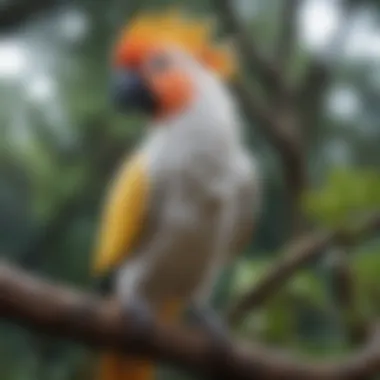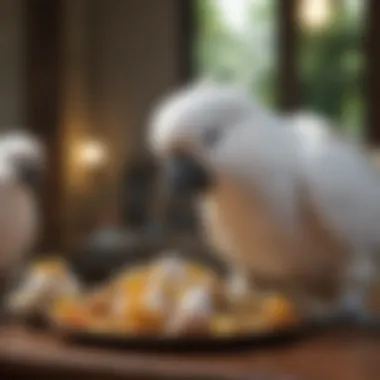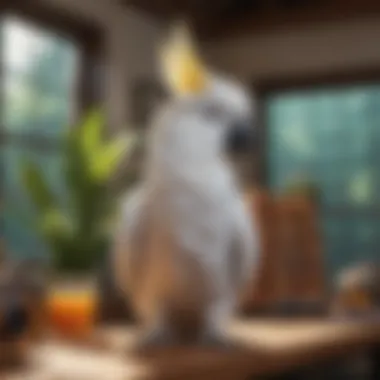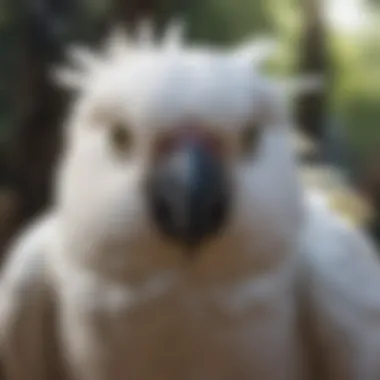The Ultimate Guide to Cockatoo Care for Enthusiasts


Intro
Caring for cockatoos requires an understanding of their intricate needs and behaviors. These birds are not just charming companions; they are intelligent creatures with distinct personalities. Failure to meet their requirements can result in behavioral issues or health problems. This guide aims to cover crucial elements of cockatoo care, ensuring that every owner can foster a nurturing environment for their feathered friends.
Animal Profile
General Overview
Cockatoos belong to the family Cacatuidae. They are native to regions of Australia, New Guinea, and nearby islands. Recognized for their striking appearances and gentle nature, cockatoos have a range of different species, including the Moluccan cockatoo, umbrella cockatoo, and sulfur-crested cockatoo. Each species displays unique traits, yet all share the same fundamental care needs.
Habitat and Distribution
In the wild, cockatoos inhabit forests, woodlands, and savannas. Their adaptability to diverse habitats can be seen in their foraging behavior. They prefer tree canopies where they find their food sources—seeds, fruits, and nuts. Understanding their natural habitat helps owners recreate a comfortable environment in captivity.
Fascinating Facts
Unique Traits and Adaptations
Cockatoos possess remarkable features that differentiate them from other birds. Their strong beaks are designed to crack hard seeds, while their highly social nature compels them to form strong bonds with their human caretakers. Their ability to mimic sounds amazes many, making them engaging companions.
Historical and Cultural Significance
Cockatoos have significant cultural relevance in various societies. In Indigenous Australian cultures, they hold symbolic meanings, often representing freedom and spirituality. Their vibrant presence in art and lore showcases the connection humans have with these birds.
Conservation Status
Current Population Trends
Many cockatoo species face conservation challenges. Widespread habitat loss poses a severe threat. Some species are listed as vulnerable or endangered. Awareness of their declining populations may encourage responsible ownership and conservation efforts.
Threats and Challenges
Cockatoos confront numerous threats in their natural habitat. Deforestation for agriculture and urban development drastically reduces their living spaces. Additionally, illegal trade in pet birds contributes to their declining numbers. Efforts focused on habitat protection are vital to their survival.
Care Tips for Pet Owners
Basic Needs and Requirements
Cockatoos require a balanced diet high in vitamins and minerals. Fresh fruits, vegetables, seeds, and specialized pellets should be incorporated. An appropriate cage size is essential, allowing for safe exploration and play. Regular social interaction is crucial, as they thrive in environments that stimulate their intelligence.
Health and Wellness Tips
Regular veterinary check-ups are necessary to monitor health. Symptoms of illness may include lethargy or changes in eating habits. Providing enrichment activities, such as toys and foraging opportunities, fosters mental well-being. Owners must also pay attention to their emotional health, ensuring a stable routine to minimize stress.
Proper care can significantly enhance a cockatoo’s quality of life. Understanding their needs is key to fostering a healthy, happy pet.
Preamble to Cockatoos
Caring for cockatoos is an intricate task that requires a nuanced understanding of their unique characteristics. This section sets the stage for our extensive examination of cockatoo care. Their social nature, specific dietary needs, and habitat preferences highlight the multiple dimensions of their well-being. Recognizing these aspects is crucial for anyone considering bringing a cockatoo into their home.
Overview of Cockatoo Species
Cockatoos belong to the family Cacatuidae, which consists of 21 species. Each species has its own distinct traits and requirements. Major groups include the Sulphur-crested Cockatoo, known for its playful demeanor, and the Moluccan Cockatoo, cherished for its affectionate nature. Understanding the differences between these species can influence the selection process for potential owners.
Some noted species are:
- Galah: The pink and grey feathers make this cockatoo easily recognizable.
- Umbrella Cockatoo: This bird is known to be quite vocal and very social.
- Black Cockatoo: Characterized by their striking looks and remarkable intelligence.
Each species' temperament and behavior can greatly affect home integration. Therefore, a deep dive into their specific needs is essential.
Understanding Their Social Nature
Cockatoos are inherently social beings. In the wild, they live in flocks, which provides not only companionship but also an avenue for complex communication. This aspect of their nature requires careful consideration when they are kept as pets. Isolation can lead to psychological issues, such as feather plucking or excessive screaming.


The social interactions that cockatoos engage in can be beneficial for their mental health. Owners should understand their social requirements, including:
- Daily interaction with humans or other pets.
- Opportunities for play and exploration.
- Time outside their cage to engage in natural behaviors.
Creating an environment that mimics their natural social habitat can greatly enhance the well-being of a cockatoo. Owners are advised to dedicate time for direct interaction and to possibly consider adopting more than one cockatoo if circumstances allow. This fosters not only happiness but also promotes mental stimulation necessary for these intelligent creatures.
Cockatoos thrive on engagement, leading to happier and healthier lives when their social needs are met.
This understanding of their social nature will be critical in the care process, setting the foundation for more in-depth discussions on their diet, habitat, health, and behavior later in the article.
Choosing the Right Cockatoo
Choosing the right cockatoo is critical for ensuring a harmonious relationship between the bird and its owner. Cockatoos are not just pets; they are intelligent, social creatures requiring specific care and attention. Each species has its own unique traits, and understanding these traits can greatly influence the success of cockatoo ownership.
When selecting a cockatoo, several factors must be carefully considered. Prospective owners should evaluate their lifestyle, living environment, and commitment level. This decision is not only about selecting a beautiful bird, but also about fostering an environment where the cockatoo can thrive mentally and physically.
Factors to Consider
- Time Commitment: Cockatoos are highly social birds that require regular interaction. Owners should expect to spend several hours daily with their cockatoo to maintain a bond and prevent loneliness.
- Space Requirements: The cage size must accommodate the cockatoo’s activity level. A larger cage is preferable, as it enables exercise and exploration.
- Noise Level: Cockatoos are vocal birds. Potential owners should be aware of their noise levels, as it may not suit every living situation. Some species are particularly loud, which may disturb neighbors in close proximity.
- Socialization Needs: Given their social nature, some cockatoos demand more attention than others. Assess your ability to meet these needs before making a commitment.
- Allergies and Health Concerns: Cockatoos produce dander, which could trigger allergies. It’s essential to ensure that none in the household have such sensitivities.
Considering these factors assists in making a well-informed choice when adopting or purchasing a cockatoo.
Different Species Characteristics
Each species of cockatoo presents distinct characteristics, all of which can influence the owner's experience. Here are a few noteworthy species:
- Umbrella Cockatoo: Known for their striking crest, umbrella cockatoos are affectionate but require extensive social interaction and mental stimulation.
- Moluccan Cockatoo: This species is larger and known for its loudness but is also very loving. They can develop deep bonds with their owners but can be quite demanding.
- Goffin's Cockatoo: A smaller species that is playful and intelligent. They are known for being curious and can easily engage in interactive play.
- Sulphur-Crested Cockatoo: Recognized for their striking plumage, they are lively and require consistent mental and physical engagement.
Understanding these characteristics can aid in selecting the species that best aligns with the owner's lifestyle and expectations. Each cockatoo merits thoughtful consideration, as their needs directly impact their well-being and the owner's satisfaction.
"The relationship between a pet cockatoo and its owner is a profound one, filled with responsibility and joy."
Selecting the right cockatoo is not merely a choice of species, but an investment in a relationship that can bring happiness and fulfillment for both bird and owner.
Cockatoo Diet and Nutrition
A well-balanced diet is essential for the health and vitality of cockatoos. These birds are intelligent and active, requiring specific nutrients to thrive. Understanding their dietary needs can prevent various health issues and enhance their quality of life. Nutrition plays a significant role in their overall well-being, from improving their feather condition to supporting their immune system. Inadequate diet leads to deficiencies that can affect their behavior and health adversely. Therefore, attention to their eating habits and food choices is necessary for any cockatoo owner.
Essential Nutrients for Cockatoos
Cockatoos require a variety of nutrients to maintain optimal health. The essential nutrients include proteins, carbohydrates, fats, vitamins, and minerals. Proteins support muscle development and feather growth, while carbohydrates provide energy for their active lifestyles. Healthy fats are important for skin and feather condition.
Key Nutrients include:
- Protein: Legumes, nuts, and cooked eggs are good sources.
- Carbohydrates: Whole grains and vegetables should be included in their diet.
- Fats: Seeds, particularly those high in omega-3 and omega-6 fatty acids, are beneficial.
- Vitamins: A variety of fresh fruits and vegetables should be offered to ensure they receive necessary vitamins, especially Vitamin A and Vitamin D.
- Minerals: Calcium is crucial for maintaining strong bones. Cuttlebones or mineral blocks can provide necessary minerals.
Offering a diverse diet not only helps meet their nutritional requirements but also keeps them engaged and encourages natural foraging behavior.
Foods to Avoid
Certain foods can be harmful or toxic to cockatoos. It is crucial to be aware of these to prevent serious health issues. Some common foods to avoid include:
- Chocolate: Toxic and can lead to severe illness.
- Avocado: Contains persin, which is dangerous for birds.
- Onions and Garlic: Can cause hemolytic anemia.
- Caffeine and Alcohol: Both can be fatal to cockatoos.
- High-fat and Processed Foods: These can lead to obesity and related health issues.
Always consult with a veterinarian if unsure about food safety.
Feeding Frequency and Portions
Feeding frequency and portion sizes are vital elements in cockatoo care. Unlike some other pets, cockatoos may require multiple feedings throughout the day. A general guideline is to provide fresh foods in the morning and offer a mixture of grains, seeds, and pellets throughout the day.
Suggested Feeding Routine:
- Fresh Produce: Daily, in sufficient quantity to ensure variety.
- Seeds and Pellets: Should make up about 70% of their diet.
- Treats: Limited to a few times a week. Focus on healthy options like nuts or dried fruits in moderation.


Portion sizes should match the individual bird's size and activity level. Monitoring their weight and adjusting food intake will ensure they remain healthy and active.
Creating a Suitable Habitat
Creating a suitable habitat for cockatoos is vital for their well-being. These birds thrive in environments that mimic their natural surroundings. A well-designed habitat serves multiple purposes. It provides security, encourages natural behavior, and promotes overall health. Failing to create an adequate habitat can lead to stress, behavior problems, and health issues. Therefore, understanding the specifics of their habitat needs is essential for every cockatoo owner.
Cage Size and Environment
The size of the cage is one of the most critical factors. Cockatoos are active and require enough space to move around freely. A spacious cage allows them to stretch their wings, climb, and play. The minimum recommended size for a single cockatoo is usually around 36 inches wide, 24 inches deep, and 48 inches tall. However, bigger is always better when it comes to cockatoos. Environments like aviaries, which provide more room, can significantly enhance their quality of life.
Additionally, the environment inside the cage should be stimulating. Providing various levels and hiding spots mimics a natural habitat. Include perches of different diameters to strengthen their feet. It is also important to ensure the cage has a secure lock system. Cockatoos are intelligent and can sometimes figure out how to escape.
Perches and Toys
Perches and toys play an essential role in a cockatoo's habitat. A variety of perches can help prevent foot problems and keep the birds engaged. Natural wood perches of various thicknesses are ideal, as they provide stability and mimic tree branches in the wild. Avoid using only plastic or metal perches as these do not offer the same benefits.
Toys are also crucial for mental stimulation. Cockatoos are known for their intelligent and playful nature, requiring toys that they can chew, climb, and manipulate. The following types of toys are generally recommended:
- Foraging toys: Encourage natural foraging behavior.
- Chewable toys: Help keep their beaks healthy.
- Puzzle toys: Challenge their intellect and keep them busy.
Rotating toys regularly can maintain interest and engagement, making them feel more secure in their environment.
Temperature and Humidity Considerations
Temperature and humidity are often overlooked factors in cockatoo care. These birds are sensitive to extreme temperatures and drafts. A comfortable range should be maintained between 65 degrees Fahrenheit and 80 degrees Fahrenheit. Cockatoos are not suited for outdoor living in harsh weather conditions. Avoid placing their habitat near windows or doors where drafts can occur.
Humidity levels should also be monitored. Cockatoos thrive in a humid environment. A relative humidity of at least 40% is ideal. If the air is too dry, it can lead to respiratory issues and feather problems. Using a humidifier or placing a water dish in their area can help maintain proper humidity levels.
Important Note: Regularly check temperature and humidity levels to ensure a suitable habitat for your cockatoo. Their comfort heavily depends on these factors, affecting their overall well-being.
Creating a suitable habitat requires thoughtfulness and understanding of cockatoo needs. Pay attention to their environment, and make adjustments as necessary to ensure they remain healthy and happy.
Health Considerations for Cockatoos
Understanding the health considerations for cockatoos is crucial for any owner. These birds, known for their charming personalities and intelligence, require attentive care to thrive. Addressing health issues early can prevent complications and improve their quality of life. Many factors influence cockatoo health, including diet, environment, and social interaction. Proper knowledge also ensures that owners can recognize when their pets might need medical attention.
Common Health Issues
Cockatoos can experience several health issues. Some of the most common concerns include:
- Feather plucking: This is a behavior that can arise from stress or boredom, leading to self-harm.
- Respiratory infections: Due to their sensitive respiratory systems, cockatoos are prone to infections often caused by poor hygiene or exposure to smoke.
- Obesity: A poor diet or lack of exercise can lead to obesity, which may result in other health problems.
- Beak and feather disease (PBFD): This viral disease affects feather growth and can have serious implications for overall health.
Cockatoo owners should familiarize themselves with these issues to promote their birds' health effectively.
Regular Veterinary Care
Routine veterinary care is essential for maintaining the health of cockatoos. An avian veterinarian can offer valuable services, including:
- Annual check-ups: Regular examinations help detect problems early.
- Vaccinations: Protect against common avian diseases.
- Nutritional assessments: Professionals can provide tailored dietary advice.
- Health screenings: Tests can identify underlying issues before they become serious.
Scheduling consistent veterinary appointments ensures that your cockatoo receives the attention it requires to stay healthy.
Signs of Illness to Watch For
Recognizing the signs of illness in cockatoos is vital for prompt intervention. Be observant of your bird's behavior and physical condition. Common signs of illness include:
- Changes in appetite: Increased or decreased food consumption can indicate health issues.
- Lethargy: A lack of energy or unusual quietness can be a sign of distress or illness.
- Fluffed feathers: This may indicate that the bird is feeling unwell.
- Changes in droppings: Abnormal droppings can signal digestive problems.
Regular observation is key in spotting potential health issues before they escalate.
By staying informed about the health considerations, owners can create a nurturing environment for their cockatoos and ensure they lead healthy, fulfilling lives.
Behavior and Training


Understanding the behavior and training of cockatoos is crucial for any owner. These birds are known for their intelligence and strong social nature. Recognizing how they communicate and interact allows owners to build a strong bond with them. Training not only enhances this bond but also enriches their lives and helps prevent behavioral issues. A well-trained cockatoo is likely to be happier and more at ease in its environment, making it essential for any caregiver.
Understanding Cockatoo Behavior
Cockatoos exhibit a range of behaviors that stem from their social nature. They thrive on interaction, both with their human companions and with other birds. Observing their body language can provide insights into their moods. For example, when a cockatoo fluffs its feathers, it may be excited or happy. On the other hand, a cockatoo that flattens its feathers could be feeling threatened or stressed.
A consistent routine can help underline the security these birds need. Cockatoos tend to be territorial, and their environment should reflect safety and familiarity. Enrichment activities are also essential to stimulate their minds and reduce boredom.
Basic Training Techniques
Training cockatoos requires patience and consistency. Positive reinforcement is the most effective method. Here are some fundamental training techniques:
- Clicker Training: This involves using a clicker to signify the desired behavior, followed by a reward.
- Basic Commands: Start with simple commands like "step up" or "come here." Always use positive tones and gestures.
- Social Interaction: Allow them to engage with you and their environment. This builds their confidence and comfort.
Always ensure the training sessions are short and enjoyable. Lengthy sessions can lead to frustration on both sides. Regular practice will yield better results, leading to a well-behaved cockatoo.
Addressing Behavioral Issues
Behavioral issues in cockatoos can arise due to various factors, such as lack of stimulation or stress. Understanding these problems is vital. Some common issues include:
- Screaming: Can result from boredom or attention-seeking. Providing toys and more interaction can help.
- Aggression: Often stems from fear or territoriality. Gradual desensitization and positive reinforcement can mitigate aggressive behavior.
- Destructive Chewing: Ensure they have proper toys and distraction techniques to prevent them from chewing on furniture or other household items.
In cases of challenging behaviors, consulting with avian veterinarians or professional trainers can provide additional insight. They may suggest tailored solutions based on specific issues.
Understanding and addressing behavioral concerns can dramatically enhance the quality of life for both the cockatoo and its owner.
In summary, grasping the intricacies of cockatoo behavior and effective training techniques fosters a more harmonious coexistence. Owners equipped with this knowledge can better navigate the challenges of caring for these intelligent birds.
Mental Stimulation and Enrichment
Mental stimulation is essential for cockatoos. These birds are known for their intelligence and social nature. They need challenges and activities to stay engaged. Otherwise, boredom may lead to destructive behavior, stress, or even health issues. Enrichment keeps their minds active and helps prevent behavioral problems. Cockatoos thrive in an environment where their intellectual curiosity can be satisfied.
The Importance of Mental Enrichment
Mental enrichment plays a critical role in a cockatoo’s well-being. It goes beyond the basic needs of food and shelter. Providing a variety of stimulating activities will enhance their quality of life. When cockatoos engage in mental challenges, they are happier and more content. Behavioral enrichment can reduce anxiety and depression. Furthermore, it can improve their ability to socialize with humans and other birds.
Some key benefits of mental enrichment for cockatoos include:
- Reduction of Boredom: Engaging activities prevent cockatoos from feeling bored.
- Behavioral Improvement: Stimulated birds are less likely to develop harmful habits.
- Physical Health: Active minds often lead to more active bodies.
- Greater Bonding: Interaction improves the bond between cockatoos and their owners.
Activities for Mental Stimulation
Creating diverse activities for cockatoos is vital. These activities can mentally challenge them in enjoyable ways. Here are ways to encourage mental stimulation:
- Puzzle Toys: Toys that require problem-solving can captivate their attention. These can be purchased or homemade. For example, hiding treats inside toys can make playtime interesting.
- Social Interaction: Regular interactions with their owners can be enriching. Talk to them, sing, or even teach them simple commands.
- Foraging Opportunities: Sprinkle food around their cage or hide it in different places. This encourages natural foraging behavior.
- New Experiences: Regularly changing their environment can be stimulating. Allow them time outside of their cage in safe areas, providing new textures and stimuli.
- Training Sessions: Training offers both mental challenge and bonding time. Teach them tricks in short, positive sessions.
“Mental stimulation is as important as physical health in ensuring a happy cockatoo.”
Closure
The conclusion section of this guide emphasizes the significance of understanding cockatoo care in ensuring their well-being. As intelligent and social creatures, cockatoos require more than just basic care. Their unique needs and behaviors make it essential for owners to be well-informed about various aspects of their lives. This knowledge helps create an environment that fosters both physical health and emotional happiness.
Factors such as proper diet, habitat setup, and mental stimulation play critical roles in the longevity and quality of life for these birds. Owners must not underestimate the impact that regular veterinary check-ups and social interaction have on their cockatoos. Each element discussed in this guide contributes to a holistic approach for cockatoo care.
Moreover, understanding how to train and address behavioral issues can significantly enhance the bond between the owner and their pet. This bond is vital because it helps in minimizing stress for both parties. A well-rounded knowledge of cockatoo care leads to a fulfilling experience for the owner and a happy life for the feathered companion.
Knowledge is power when it comes to cockatoo care. A well-informed owner can recognize needs and respond effectively.
Summary of Key Points
In summary, the key points covered throughout this guide include:
- Species-Specific Needs: Different cockatoo species may have varying care requirements.
- Balanced Diet: Proper nutrition is crucial, focusing on the right balance of seeds, fruits, and veggies.
- Habitat Design: Creating a comfortable and stimulating environment helps reduce stress and encourages natural behaviors.
- Regular Health Checks: Monitoring health and seeking veterinary care promptly ensures early detection of issues.
- Behavior Understanding: Training and social interaction are essential parts of cockatoo care.
- Mental Enrichment: Activities designed to engage their minds prevent boredom and enhance well-being.
These points collectively outline vital elements of a successful cockatoo ownership experience.
Final Thoughts on Cockatoo Ownership
Owning a cockatoo can be a rewarding endeavor. However, it comes with responsibilities that should not be taken lightly. Understanding the complexities of their diet, habitat, and health needs is paramount. As unique beings, they thrive on interaction and mental engagement. Choosing to welcome a cockatoo into your life means committing to providing a nurturing and stimulating environment.
While the joyful moments of companionship can be immense, the challenges are equally substantial. Prospective owners must evaluate their capacity to meet the care requirements. Informed decisions lead to happier lives for both cockatoos and their human caretakers. Investing in knowledge now can result in lasting satisfaction in the journey of cockatoo ownership.















